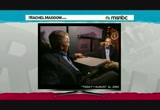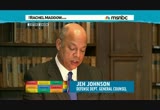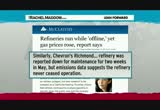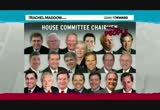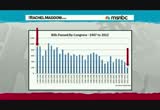tv The Rachel Maddow Show MSNBC December 1, 2012 1:00am-2:00am PST
1:00 am
this is very grass roots. >> this is very grass roots. it's led by a community group. they are asking for a union. they are forming their own independent union. >> this is very interesting. >> it's pretty exciting. >> it's a change of the times. it's one to follow. sarah jaffe, thank you for joining us tonight. that's "the ed show" on this friday night. "the rachel maddow show" starts right now. good evening, rachel. >> good evening, ed. have a great weekend, my friend. >> i will. you too. thank you. do you remember the color-coded alert system we used to have? remember that? tom ridge announced the exist tense of our national color-coded be afraid alert chart about a decade ago. we could tell at a glance how alert we were supposed to feel. and if you didn't feel like glancing at the be alert chart, at least a at the airport they
1:01 am
would read periodic recorded statements over the intercom telling you out loud that today's threat level was orange. the threat level was always orange at the airport no matter what else was going on in the country. we don't do that anymore. we don't do that. we got rid of the chart thing last year and nobody complained. we also no longer have this. this is the google street view of one of the secret prisons we used to have in romania. the associated press did an overhead satellite view so you could see how snubbed up it was against the railway lines in a densely populated area. that was ours. we are a country with 2 million people in prison or jail on any given day. america has thousands of prisons and jails here at home, but we decided to open up something in romania too in secret. also in poland and a bunch of other places.
1:02 am
we don't do that anymore either. they emt tid them out in 2006 and in 2009 it became official policy that we don't do that anymore. for years do you remember there was a ban on taking photos at dover? a ban on taking photos of flag-draped coffins of americans killed in war having their bodies brought back home to the united states. we the public were banned from seeing those pictures for years. but that ban is over now. we do not have that ban anymore. we don't do that anymore. we're now allowed to see. for awhile top level u.s. policymakers approved torturing people. and americans did torture people based on policy advise that it was legal for them to do so. but the current president put a stop to that right when he took office. we don't do that anymore. some things we stop doing. some things that we were told, yeah, maybe this is unprecedented, maybe this sunt seem like the thing america
1:03 am
does, but we have to do that. some of those things from the past decade are things that we have stopped doing. that said, some of the things we still are doing are still pretty hard to get your head around. we're still fighting the longest war in u.s. history and still has two-plus years on the clock. it's the longest war in u.s. history and we were fighting it at the same time as another one of the longest wars in u.s. history. . if you told anybody in advance of that plan that that's how our country would spend the first decade plus of the 21st century, you would have been laughed at. before we started doing it, you could not have convinced anyone that after we closed our secret prisons in places like romania, we'd keep one in a nearby communist country that doesn't want us there. in advance of us starting to do that, how would you have convinced somebody we were going to do these things?
1:04 am
how would you convince them that the united states would consider it it legal to find a wanted american citizen living abroad, track him down, and then for the u.s. government to kill him with a missile in that other country? the man's father went to court to try to stop the u.s. government from doing it. the father sued to say in advance that his son should be arrested instead of killed on the spot if he was found, but he was found and he was just killed on the spot with a missile. u.s. citizen. then a month later, we killed his 16-year-old son too. also an american citizen. same cause of death. we have done things in the past decade or so that if you asked anybody in advance of us starting to behave this way, whether the united states would be a country that behaved this way, no one could have predicted that. the response of a massive terrorist attack in 2001 would be we would declare we were at war.
1:05 am
congress passed an authorization of military force against the group that attacked us and associated forces. and the power granted by that authorization to use force undergirds a lot of the things we have done. things that constitute unimaginable behavior for the united states of america. we're on a war footing. and is that war footing forever? that's the question, right? when does it end? it's not a philosophical question, it's an empirical question. it's not a war we planned on winning. we planned on fighting it for
1:06 am
awhile and eventually stopping, maybe. i'm not just saying that because that's my take on it. i'm saying that because it's been the understanding all along from the people who declared this war in the first place this was never something we were going to know it was over because we had a winner. it was never planned that way. >> you said to me e a second ago, one of the things you will lay out in your vision for the next four years is how to go about winning the war on terror. that phrase strikes me a little bit. do you really think we can win this war on terror? for example, in the next four years? >> never in four years. >> can we win it? do you see that? >> i don't think you can win it. >> your daughters are how old now? >> 22. >> they are approaching the age, president bush, they will have their own children. when their kids are teens, are they going to those grandchildren to be reading about al qaeda in the newspaper every day. >> if we're resolute and i say those words seriously, it's less likely that your kids are going to live under the threat of al qaeda for a long period of time. >> definite end. i don't think you can win it. our country has used the idea that we are at war.
1:07 am
not just in iraq or afghanistan, but all over the globe. we have used the idea we're in the global war as the justification of us doing all kinds of things and all kinds of power that would otherwise be not just indefensible for a country with a constitution like ours, but almost unimaginable. in this global war of ours, they said would not end because there was going to be a winner declared. it's not that kind of war. if that's the case, and being in a war footing is what justifies this behavior we wouldn't otherwise be participating in, when does this war end? when do we say that the global war we e declared more than 11 years ago is now over? today for the first time, a u.s. government official started talking about how this ends. >> now that efforts by the u.s. military against al qaeda are in their 12th year, we must also
1:08 am
ask ourselves, how will this conflict end? >> this is it the top lawyer at the pentagon. the general counsel of the defense department, jay johnson, speaking today at oxford university in britain broaching a subject that nobody at a high level of government has been willing to officially broach since 9/11. >> how will this conflict end? it is an unconventional conflict against an unconventional enemy and will not end in conventional terms. we cannot, and should not, expect al qaeda and. its associated forces to all surrender, all lay down their weapons in an old field or to sign a peace treaty with us. they are terrorist organizations. nor can we capture or kill every last terrorist who claims an affiliation with al qaeda. i can offer no prediction about when this conflict will end. or whether we are as winston churchill once described it near the "beginning of the end." on the present course, i do
1:09 am
believe, there will be a tipping point. a tipping point at which so many of the leaders and operatives of al qaeda and its affiliates have been killed or captured and the group is no longer able to attempt or launch a strategic attack against the united states. such that al qaeda, as we know it, the organization that our congress authorized the military to pursue in 2001, has been effectively destroyed. >> approaching a tipping point. i just want to jump in for a second to say this is the unprecedented part that we have been waiting pr. watch. >> at that point, we must be able to say to ourselves that our efforts should no longer be considered a "armed conflict against al qaeda and its associated forces." rather a counterterrorism effort against individuals who are the remnants of al qaeda or are part
1:10 am
of groups unaffiliated with al qaeda for which the law enforcement and intelligent resources of our government are principally responsible. >> at some point, it will stop being war and go back to plg police work against terrorism as a threat that we fight, but we do not say we are at war with it anymore. how much would it change us back as a country to hit that point? can we go back? have we irreversibly changed ourselves for being at war for 2 years now? is this first word on how we might do it reasonably expect we are going to get there? >> war violates the natch really order of things in which children bury their parents. in war, parents bury their children. we must not accept the conflict as the "new normal." >> joining us is john suskind. thank you for being here.
1:11 am
>> my pleasure. >> is there a window of political opportunity right now in washington after this election to change the footing we decided on after 9/11? some of the stuff the president carried over? >> indisputably. that's what people are hopeful about. is this going to be a predicate? an opportunity for the president now that he doesn't have to stand for reelection? to do some things people hoped he would have done in his first
1:12 am
term. certainly shut down guantanamo. there are clear issues here of the presidency hopefully snapping back into the shape it had prior to 9/11. that's the hope of lots of constitutional scholars. it has not done that up to now. most of the powers granted or obtained by the bush administration have conveyed, if you will, to the obama administration. so the question is this the beginning of the president creating a new normal, as johnson says, in which we are not in a state of war and the president is not executing war powers in a consistent and endless way? >> ron, you are a student of leadership, both a student of good leadership and bad leadership. i feel like leaders good and bad can generally be counted on to never give up power that they have been granted. if this president does draw a hard line under the war, the war on terror and say the war is over and the powers associated with this war are no longer the
1:13 am
powers of this office, i mean, is that a fantasy? is this something you can imagine this president doing? >> you know, if he's going to do it, this constitutional law president, it will be in this term. it might be to the end of the term. the issues, no matter what happens on some of these sort of legal sort of standards, the issues in a way don't change. small groups of people can get their hands on weapons that were once powerful and reserved for nations. that doesn't change. that's carried by technology and it's one of the great perils of the modern age. that rule of law dually designated to shape the u.s. policies. now here, let's be clear on what's at stake here. it's not so much drone strikes. that's been misinterpreted. the president under the powers of the articles can continue with essentially the kind of global war on terror, call it
1:14 am
whatever you will, that he's been conducting. what he can do is kill, but he can't capture, interestingly enough. the being issue is guantanamo. this pronouncement by jay johnson really is about guantanamo. under the current legal framework that we're looking at, guantanamo, that won't work if we're not at war. they will have to come up with a different legal structure to make that operative. certainly, congress can do that at some point. but guantanamo is the question mark based on what johnson said. maybe him auditions for attorney general, but it may be mrp that. a little bit of groundwork by this administration to say we're thinking about this and this may be up ahead now that the president doesn't have to stand for reelection. >> in terms of a political predicate, is there any significance of him delivering this speech not in the united
1:15 am
states? i mean he did this speech at this speech not in the united states? i mean he did this speech at oxford and did it right after the election. do you see that as important? >> you know, i think time and place is always important. the british have a bit of a different position than e we do. they are a little bit ahead of us, you might say, on some of the issues of detainees, of how we conduct ourselves globally. i think we don't really know here, rachel, until we hear from the administration. people will be pressing the administration saying can you give us specifics? is this the start of a new way of thinking of policies that might be unfolding in the next couple months? or is this a trial balloon and you're seeing how it looks and how people react to it and it may fall under the category of we're trying, but not much is going to happen. the fact is if there's another terrorist attack in the the
1:16 am
united states, many of these issues go right back to where we were back to the restart button. and be clear, under the article 2 powers of the presidency, this president can do a great deal. everything he does now and then some. the key issue is guantanamo. those prisoners, 166 prisoners including 50 hard-core, the president said we don't know what we're going to do with those people. they would be sitting without a legal framework if we pull back from this war powers declaration from 2001. that's a big issue. that's a complex one. >> ron, thank you. it's great to have you here. >> my pleasure. >> if you want to have a further gander of that speech, we're posting clips on our website if you want to check that out. you know the shady trickery from this year's election about who would get to vote and how hard certain states were going to make it to vote? all that trickery is still paying dividends today.
1:20 am
1:21 am
that brought an even bigger change. it swept powers that year in a way they hadn't done in ages. republicans took control of more seats at the state level in that election than at any time since 1928. their sweep in 2010 ushered in two years of republican governance that as much as anything else defined the republican party and what being a republican stood for. so it was two years of rolling back abortion rights and stripping union rights and passing really hard line immigration laws and making it harder for people to vote, making it harder for people to register to vote. it was years of governance in the dates defining what it meant to be a republican. in the way that the national candidates sometimes tried to run away from. the proof is in the pudding. you know what you will be like in power. we know what your party will be like in power because of how you have comported yourself with the power you have already got. what happens in the states matters across the country, even
1:22 am
in national elections. that was the legacy of 2010. this year in 2012 overshadowed by the presidential election and the congressional results once again, this year again, something amazing happens in the states. in 2012 this past election, an avalanche of states that are previously been under divided government, those states have now moved to one party controlling everything. so north carolina, the republicans winning back the governor's mansion means that republicans there will control the house and the senate and the governor's seat. in minnesota, other direction. democrats won back control of the house in minnesota and the stat there and because they already held the governor's mansion that means one party, democratic control throughout that state next year. so it went across the country. the parties consolidated powers at the state level that's without precedent in american history. red states got really red, blue states got really blue.
1:23 am
it goes further than that. it's not just one party rule. it's one party mega rule in a lot of states. look at california. democrats don't just have a majority in the legislature now. they are going to have a super majority. meaning that republicans essentially don't have enough minority power to stop anything the democrats want to do. the same story in indiana, but for the republicans. indiana republicans will have a super majority in the house and in the senate and they hold the governor's mansion. dit to in oklahoma. they turned it into a bigger super majority. this is what happened in 2012. not just the disappearance of divided rule in the states. but the rise of super majority one party rule. that's a position of immense
1:24 am
power for whichever party it is in control. they get to do what they want. if you think about it, you better trust those people because there's no bull work against them in these states. one state on the precipice of getting that super majority status is the great state of ohio. heading into this year's elections, republicans in ohio controlled the governor's mansion, house, and senate. in the senate, republicans currently have the super majority status. it's the democrats -- there are democrats there, but they are powerless. and the ohio house, republicans are definitely in control there. they have the majority, but will they have a super majority there too? an uncheckable mega majority that lets them rule at will? they might. they are one seat away from that in the ohio house. one seat away from giving republicans total unobstructed
1:25 am
control. rendering the democratic party essentially moot. they only need one house seat to get that. if and in ohio there are two house seats that have not been called. that are too close and have gone to a recount. if republicans win both seats, republicans will have, what's a nicer way to say a death grip on power in that state? how will the races be decided? remember this guy? republican secretary of state john husted of ohio. he worked tirelessly leading up to the election to try to limit the number of days with early voting in the state. early voting tends to favor democrats. he tended to make it so republican-leading parts of the state would have more of an opportunity to early vote than democratic-leaning parts of the state. but the other thing john husted did was fought up until election day to make it easier for him to throw out provisional ballots.
1:26 am
those are ballots that are put aside because there's so question about that it voter's eligibility or where they are voting. and in the two house races that have yet to be decided, guess what it's coming down to. in one of the races, it's 14 votes that separate the two candidates. 14 votes between them. in that race, the the number of ballots that john husted be ordered be thrown away is 114. that might make a difference np. in the other house race, the candidates are separated by 119 votes. guess how many provisional ballots john husted wants thrown out? more than 270. in those two races, democrats are alleging that the provisional ballots, which could decide these two races and decide whether republicans have a super majority in the state, ohio democrats are alleging the provisional ballots are being thrown out illegally. democrats say the ballots are
1:27 am
being thrown out in violation of federal law. these races are so close, their outcomes will determine the balance of power. they will determine if republicans have a super majority that renders democrats irrelevant and that question is hanging on those provisional ballots that democrats say the republican secretary of state is having thrown out illegally. ohio democrats are suggesting they are going to sue over what's going on there right now and you can understand why they might.
1:30 am
the 80th congress of the united states did very little. little enough that when president truman called it the do-nothing congress, everybody agree eed. look it up. it's in the index of your high school history book. i swear. the 80th congress, which changed the course of american political history by famously doing nothing, was like an auto plant
1:31 am
working at full capacity compared with the current congress that's sputtering to its end. wait until you see what the new incoming congress has in store for itself. what we have just learned about what the new congress plans for itself will make you want to be in congress. even if nothing else in your whole life has ever made you want to be in congress before. that's coming up. there's a school of no so much political science as sort of political pseudo science that says what the price of gas is determines our elections. it's not necessarily true. it sounds compelling but the more facts you look at, the correlation is not really bourn out over time. it's one of those things that get passed on as if it's a truth that people like to believe in. whether or not it is true. and in newt gingrich's slow run at the presidency this year, it
1:32 am
seems like newt gingrich maybe got enamored with that wise tale. he thought he would take miz presidential campaign about gas prices for awhile. thereby creating the impression that gas prices might go down under him if he were elected president. that was his planned road to the white house for awhile. that road did not lead to the white house. it didn't even lead to a fox news gig. what's he doing now any way? gas prices are not just politically sailing. they are sailing it because they are sail yant to our economy, the price of gas has an impact on how much pocket change americans have to save or spend on anything else. >> people are not happy this morning. gas prices are going up. many people are flocking to places like this to find the cheapest gas prices around. right now a gallon is going to cost you $4.13. last week it jumped 16 cents. prices are expected to go up
1:33 am
another 20 cents in the next few days. >> gas prices go up and down. there's supply and demand. every once in awhile like in that report, there's a dramatic spike. the weird thing about that particular gat spike in may that sparked that report was that that spike was really isolated. gas prices went way up in california, even as gas prices everywhere else were going down. and at the same time that gas prices were going up in california, crude oil prices [ male announcer ] we all make bad decisions. like say, gas station sushi. cheap is good. and sushi, good. but cheap sushi, not so good. it's like that super-low rate on not enough car insurance. pretty sketchy. ♪ and then there are the good decisions. like esurance.
1:34 am
their coverage counselor tool helps you choose the right coverage for you at a great price. [ stomach growls ] without feeling queasy. that's insurance for the modern world. esurance. now backed by allstate. click or call. there's a school of no so much political science as sort of political pseudo science that says what the price of gas is determines our elections. it's not necessarily true. it sounds compelling but the more facts you look at, the correlation is not really bourn out over time. it's one of those things that get passed on as if it's a truth that people like to believe in. whether or not it is true. and in newt gingrich's slow run at the presidency this year, it seems like newt gingrich maybe got enamored with that wise tale. he thought he would take miz presidential campaign about gas prices for awhile. thereby creating the impression that gas prices might go down under him if he were elected
1:35 am
president. that was his planned road to the white house for awhile. that road did not lead to the white house. it didn't even lead to a fox news gig. what's he doing now any way? gas prices are not just politically sailing. they are sailing it because they are sail yant to our economy, the price of gas has an impact on how much pocket change americans have to save or spend on anything else. >> people are not happy this morning. gas prices are going up. many people are flocking to places like this to find the cheapest gas prices around. right now a gallon is going to cost you $4.13. last week it jumped 16 cents. prices are expected to go up another 20 cents in the next few days. >> gas prices go up and down. there's supply and demand. every once in awhile like in that report, there's a dramatic spike. the weird thing about that particular gat spike in may that
1:36 am
sparked that report was that that spike was really isolated. gas prices went way up in california, even as gas prices everywhere else were going down. and at the same time that gas prices were going up in california, crude oil prices were going down. and even weirder, gas inventories were plentiful. they were going up. there was more supply. there was a lot of gas around. then why would it be getting more expensive? we were told refineries were the told problem. >> gas jumped 16 cents at many stations in california and prices are expected to go up another 20 cents in the next few days. analysts say refineries are at its lowest level in 20 years in several california fifties. we're also dealing with repairs and maintenance issues. >> repairs and maintenance issues at the refineries. so crude oil prices are down, plenty of gas in the inventories, but the refineries
1:37 am
were not working at capacity because of repairs and maintenance issues. so california was getting a giant price spike. the biggest gas market had their prices going up. down everywhere else, but up in california. but there was no real reason to question it because it's happened before. a chevron refinery in california caught fire in 1989. flames shot 100 feet in the air. seven people were injured. . gas prices spiked right away and people blamed the fire. the fire slowed supplies to retailers by 25%. gas prices in california went up. refinery goes down, prices go up. march 1999, same refinery. another huge explosion. it was the second refinery fire in the state that month. you guessed it. after that, gas prices went up in california. of course, they did. just this past august, same refinery in california caught on fire. nobody was killed, but people in
1:38 am
the area were told to stay inside their homes. drivers were told to close their windows. four train stations were shut down. and gas prices went up. you notice a trend here? that one refinery in richmond that has spent the last 25 years catching on fire over and over and over again, that's one of the refineries we were told in may with that mysterious price spike that that it refinery was offline. that's why we had the spike. the other one was this one. the royal dutch shell refinery in martinez, california. we were told they were offline for maintenance. so these two refineries being down, prices are going to go up. that's what drove up the prices in california despite all the other factors saying it shouldn't have gone up. that was in may. and people in california were prepared to accept that explanation. history had prepared us to accept that explanation. however, check this out. earlier this month, a news service got a hand on a report that looked at environmental documents. thousands of environmental documents from the point in time when those refineries were supposedly offline. down for maintenance work. here's how they describe the report's findings "in may at a time when the shell's plant was report to be down, it appears to have been making gasoline for at least half that time. remissions returned to normal a
1:39 am
full week before it reported to have come back online. really? similarly, chevron's richmond refinery was reported down for maintenance for two weeks in may, but a missions data suggests the refinery never ceased operation. shell's refinery in martinez, they were supposedly offline not making anything. gas prices had to go up, but at least one report concludes actually they were up and running. what, they just didn't want to say so? everybody knows how supply and demand works. but in this case, if supply and demand don't explain what was going on here, that's a scandal that had a huge economic impact. were the companies lying about this just to boost prices up and pocket the difference? does this happen all over the country? what's going on here? and what tools do we have to environmental documents from a point in thyme when those refineries were supposedly offline. down for maintenance work. right? here's out mcclatchey explains. at a time in may, reported down for maintenance for two weeks, it appears to have been making gasoline for at least half that time. state environment records show. nitrogen oxide emissions have returned to normal at the refinery, a full week before it was reported to have come back online. really? similarly, chevron's richmond refinery was reported down for maintenance for two weeks in
1:40 am
may, right, that's what we were told, but emissions data suggests the refinery never ceased operation. shell's refinery in martinez and chevron's in richmond were supposedly offline not making anything so gas prices had to go up. one report concludes actually they were up and running. what? they just didn't want to say so? everybody knows how supply and demand works. in this case if supply and demand do not explain what was going on here, that's a scandal. that had a huge economic impact. were the refinery companies lying about this just to boost prices up and pocket the difference? does this happen all over the country? what's going on here? and what tools do we have to figure it out if we are being suckered? we do have ta tool. it lives in the department of justice. six western senators are calling on the department of justice to conduct a refinery by refinery
1:41 am
investigation of what happened during that gas price spike in may. and another one that happened in october. is the energy industry snookering us and will they get caught if they are? joining us now for "the interview" is senator maria cantwell. she has been leading this charge. it's nice to have you here. thank you for joining us. >> good evening, rachel. >> let me ask in my layman's summary of that discussion, both the supply and demand factors at work, but what might have happened in may in the environmental report. did i get the basics of that right? is that basically the situation? >> rachel, i'm convinced that maddow matters. that you drill down on the substance of these issues and that's exactly what we need the department of justice to do. >> what was it about the price spike in may and then again in october that seemed suspicious
1:42 am
to you? was there something that tipped you off to start questioning whether or not that was a legitimate price strike just explained by supply and demand? >> well, my constituents tipped me off that they were frustrated gas was going toward $5. what they knew is one refinery went down, but why was everybody else saying that they were offline or a lot of the market response basically saying the price spike was caused by a shortage? well, you outlined how inventories and supply were there, so supply and demand didn't seem to really be the issue. so our question is this. did these entities create the perception of an artificial shortage and thereby drive up the price of gasoline? that's what we want the department of justice to investigate. we want the ftc and the department of justice to be the policemen on the beat on something so important as gas, as you said, it's like the lifeblood of an economy.
1:43 am
if you affect it by that price spike, it affects day-to-day consumers, our economy, and jobs and everything else. >> do you believe the department of justice is capable of mounting this investigation in a rigorous way? do they have the tools they need? do they have a track record of investigating stuff like this well? >> they do have the tools they need. that's why we're asking the department of justice to be involved now in addition to the ftc is that the investigative arm of the department of justice can marry up with the regulatory authorities that agencies like the commodities future trading commission have or other agencies and do a comprehensive, you know, approach, to get all of the data. and, yes, this task force existed before when it tried to tackle the enron problem. another area of energy, electricity, but an area where we saw a lot of the same schemes being perpetrated on the public, you know, by people moving supply around or creating images about supply that really weren't true.
1:44 am
in this case, it appears that there's some evidence that we want them to investigate. the fact while they said they were down, emissions were still coming out of some of these facilities which would lead you to believe they were actually producing supply. >> we contacted the western states petroleum association to get their response to this, to the mcclatchey report and this call for an investigation. they told us the department of justice elects to investigate gas markets on the west coast. we're confident the investigation will reach the same conclusion dozens of other investigations over the past two decades have reached that gasoline and diesel prices on the west coast are determined principally by supply and demand. they also said the author of the report who i cited in my introduction, he's not an expert in the oil industry and clearly
1:45 am
does not understand refinery operations. his report contains many suspicions and theories but does not prove anything. let me get your response to the remark from the western states petroleum association. >> there's a lot to cover there. let me just say this. there's a new law on the books of the last few years that basically says that it is against the law to have any manipulative devices or contrivances as it relates to moving oil supply. this is a relatively new statute. it's not the issue of whether the oil companies got together in an anti-trust conspiracy to set pricing. this is about whether somebody, as i was saying before, created the image of an artificial shortage just to drive up price. and the reason why that law was passed is because we saw too much going on in our energy markets, something that's so critical to our economy, that we wanted to have a tougher regulation on the books. so this authority has been used in electricity and natural gas and a federal agency overseeing those entities have instigated over, i think, 107 cases and have had hundreds of millions of dollars of fines against companies who have had bad practices. so we're asking that the ftc and
1:46 am
and the doj use the power that is in current statute, although relatively new, to do the same kind of policing in these energy markets and to mr. mccullough in oregon, we couldn't thank him enough in the northwest. because when the federal entities in charge of electricity failed to investigate fully the enron case, mr. mccullough provided crucial evidence by investigating tapes and documentation on behalf of our utilities in the northwest that proved successful in saving our consumers over $1 billion. so i can tell you he's done great work before, and he's the first to admit that what we really need now is the department of justice to use their full power and get to the bottom of this. >> senator maria cantwell from washington state, chair of the senate subcommittee on energy. thank you for helping us understand this. please keep this apprised.
1:47 am
1:51 am
tell me if this is a problem. here are the gop committee chairs. show that picture. every one is a middle aged white guy. okay. is there a diversity problem in the republican party? >> the fact is, that picture by definition, is not helpful. >> mr. gingrich, i agree. that picture is not helpful if you are a member of the republican party. a party that just got shellacked in the most recent election, among any voters who were not, themselves, middle-aged white guys. turns out there's a whole bunch of those voters. it is not helpful for the republicans for the country to see a picture of the 19 republican congressmen elected to chair all of the republicans' congressional committees this next year. 19 committees, 19 white guys. some of whom defeated republican women members of congress who wanted those chairmanships. but republicans gave it to the
1:52 am
guy instead. like for example, congresswoman candice miller, a representative from michigan's tenth district. she's a republican. she wanted to be picked to chair the homeland house committee. she was a member of that committee. her party said no, she was not picked. they picked a guy instead. and not picking of women set off a kind of amazing attempt at damage control in the house most of which was conducted by republican congresswomen themselves. they set their hopes on the fact there were still two committee chairs to be doled out. 19 committees had been assigned to 19 republican men. but there were two more committees where the chairmanships were doled out by the speaker of the house, himself. so maybe he'd pick a woman for those committees, right? the problem of course is that in this upcoming congress, there are zero republican women
1:53 am
serving on either of those two remaining committees that are still looking for a chair. so how could you put the chair to the committee when there's nobody in the membership -- who's speaker boehner going to put in charge if there are no republican women on those committees? i mean, has that ever been done? has the speaker ever taken somebody who is not a member of the committee and made them the chair of that committee? has that ever happened? we have been digging around for an answer to that all day. and the answer appears to be, never. at least not since the 19th century. when committees were assembled in a very different way than they are today. that's what makes today's news so interesting because house speaker john boehner announced today that he did find a gal. congresswoman candice miller we guess he's decided to put in
1:57 am
harry truman's 1948 reelection campaign had all of the hallmarks of failure. two years earlier his party lost house of both parties of congress. his legislative agenda was stalled. one of those in his cabinet announced he would run against his former boss as a third party candidate. truman's approval ratings were bottom of the barrel low. things were not looking good. he expected to lose his bid for reelection. the chicago "daily tribune" went so far to print a headline saying he did lose his bid for re-election. but truman won. and he won in part not just because he ran against his republican challenger but also against that republican congress. at his nominating convention that year, president truman delivered one of his most fiery
1:58 am
speeches ever. he called the republican-controlled congress the do-nothing congress and called on that do-nothing congress to return to washington to a special session to finally do its job and pass legislation, thank you very much. after that fiery convention speech, congress did come back for a special session and they still did nothing. and president truman, therefore, continued to call them the do-nothing congress. and he railed on them about it on the campaign trail. and that campaign trail led him all the way back to the white house for a second term. 1948, harry truman talking about and criticizing the 80s congress. this congress, the one in washington today is the 102nd congress. here's what has happened since the time of truman's do-nothing congress. that is truman's congress there, the red arrow there, the one that couldn't get anything done, so terrible and hapless and unpopular that truman was able to run an otherwise hopeless campaign against them and win. the graph shows how much legislation was passed by that congress. right? that was history's do-nothing congress. here's our current congress. the good old 112th.
1:59 am
here's our current republican-led congress. truman's congress passed a meager 900 or so bills. our congress passed fewer than 100. the weakest most anemic record on record for any congress ever since the congressional clerk started counting the number of bills passed, no congress has accomplished less than john boehner's congress. you know what, it turns out people still care just like in truman's time. the esteem the american people have for congress now is in mired in the low double digits. so there are still a few more days left in the 112th congress. they have set a new mark for congressional uselessness. the good news is nowhere to go but up, right? maybe not. today the republican house majority leader eric cantor released the new house calendar for next year for the next congress. and if you're hoping for a little more production next year, compared with this year, look, 365 days on the calendar next year. republicans have decided to give themselves 239 days off
171 Views
IN COLLECTIONS
MSNBC West Television Archive
Television Archive  Television Archive News Search Service
Television Archive News Search Service  The Chin Grimes TV News Archive
The Chin Grimes TV News Archive 
Uploaded by TV Archive on

 Live Music Archive
Live Music Archive Librivox Free Audio
Librivox Free Audio Metropolitan Museum
Metropolitan Museum Cleveland Museum of Art
Cleveland Museum of Art Internet Arcade
Internet Arcade Console Living Room
Console Living Room Books to Borrow
Books to Borrow Open Library
Open Library TV News
TV News Understanding 9/11
Understanding 9/11





